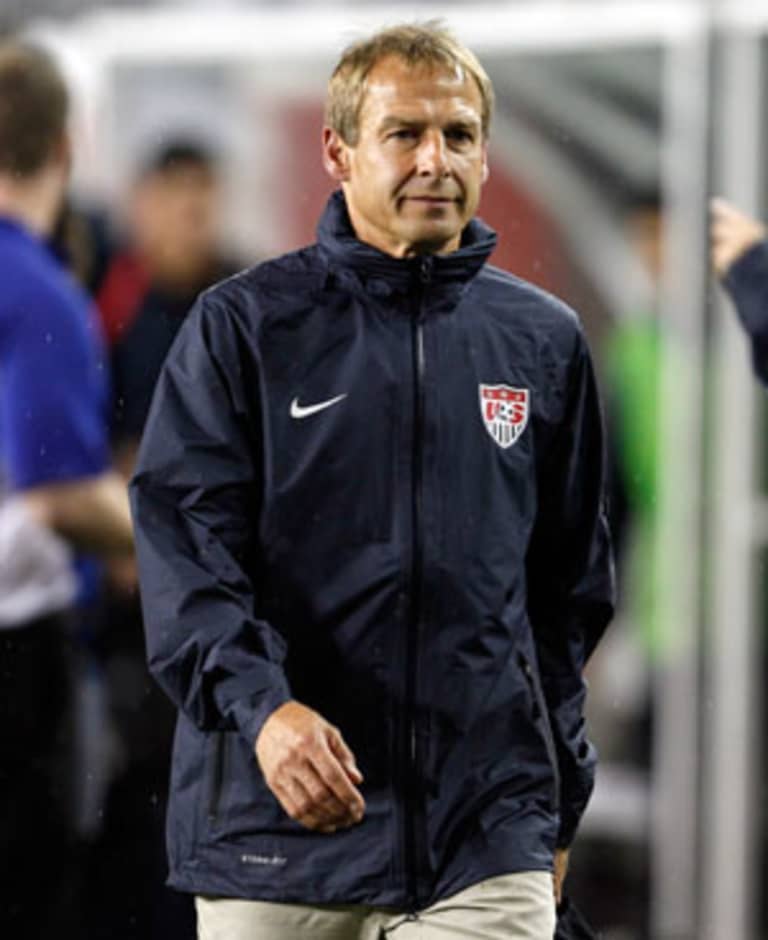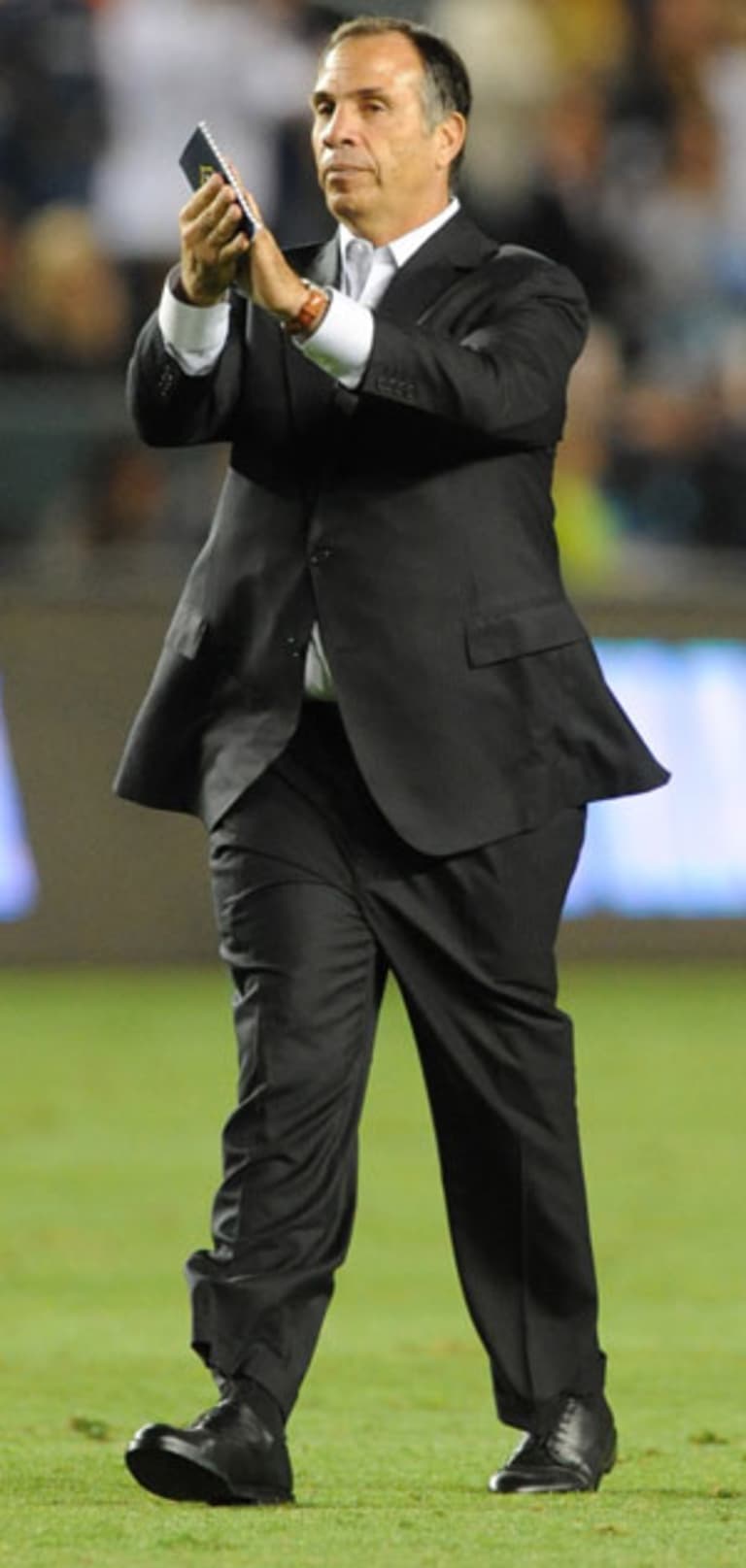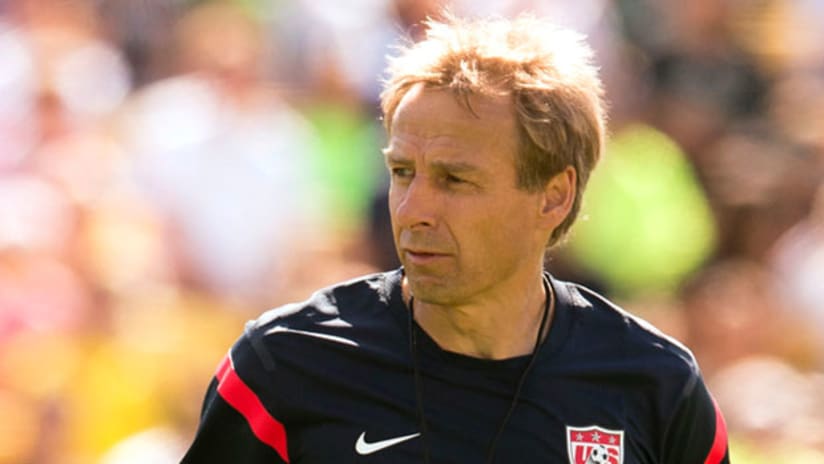“Some guys are out of their comfort zone, absolutely. It’s not actually the coach that has to adjust to the players, to kind of think about it, ‘How do I communicate it perfectly [and] correctly to the players?’ It’s actually the players’ job to take the information from the coach, with whatever personality the coach has and let it kind of sink into his own system.”
– Jurgen Klinsmann
Take all the scathing criticism hurled at Jurgen Klinsmann in Tuesday’s revelatory Sporting News piece about the crisis with the US national team and set it aside for one second. Just read that quote one more time – it’s one of the most revealing parts of veteran reporter Brian Straus’ piece – and think about what it means when a coach says it’s not really up to him to communicate with his players.
That idea – that Klinsmann expects up to 24 players of different ages, backgrounds, skill levels and egos to somehow interpret one message the same way – is perhaps the most striking part of the story released Tuesday that could put the players on something of a media lockdown ahead of a World Cup qualifier against Costa Rica on Friday.
Unnamed US players took dead aim at Klinsmann in the Sporting News piece, questioning everything from his tactics to his motivational skills, and from his penchant for German-American players to his coaching style. But nothing leveled at Klinsmann is more upsetting than his own, on-the-record approach about communication, and now it appears his biggest failure might be an inability to do what we all want from any of the authority figures in our lives: Relate.
Strangely enough, one of Klinsmann’s biggest attributes when he was named US head coach in August 2011 has also always been one of his biggest detriments: His incredible success as a player. It’s nearly impossible for some of the players Klinsmann is coaching right now – think Sporting Kansas City star Graham Zusi, or LA Galaxy defender Omar Gonzalez – to relate to the level of stardom and success Klinsmann achieved as a player with clubs like Tottenham, Inter Milan or the German national team, the last of whom he won a World Cup with in 1990.

But all that success matters little when he can’t clearly identify or communicate with the players he’s coaching. And by most accounts – some of them very clearly stated by some disgruntled players in the
Sporting News
piece – he hasn’t done it yet. He’s proven to be an incredible motivator and a feel-good spokesman for the future of soccer in the United States, but he appears to be asking his players to come to him to understand how they’ll get there, instead of the other way around.
READ: What's the fallout after players speak out on Klinsmann?
The biggest testimony in favor of Klinsmann’s communication skills in the Sporting News piece comes from Houston Dynamo midfielder Brad Davis, who, coincidentally, was added to the 24-man roster on Tuesday. Davis, a longtime fringe national team player who finally returned to the fold during the January camp, is quoted as saying that Klinsmann offered a wealth of feedback on his performance, and it was a far cry from previous coaches that held their opinions close to their chest before sending him back to Houston disappointed.
US veteran Carlos Bocanegra defended Klinsmann on Tuesday, too, via a Facebook post that indicated the US coach “will tell you to your face where you stand,” and that “from a coach, that is the best thing you could ask for.” Early returns from Klinsmann’s first few games on the scene in 2011 were positive as well, with players like Brek Shea, Landon Donovan and Kyle Beckerman praising Klinsmann’s easy-going approach to communication and how he preached creativity and confidence.
“He’s constantly telling us positive things,” Beckerman said after Klinsmann’s debut against Mexico in August 2011. “It gets everyone to really believe. He takes some of the pressure off the guys and puts it on himself. It’s been a pleasure to play for him.”
READ: Bocanegra takes the high road after USMNT snub
No one appears to be questioning Klinsmann’s positivity, but his attempt to inspire players with the motivational words “be creative” may have worn thin. One player in the Sporting News piece said that Klinsmann’s typical pregame message is “go express yourself,” which certainly played well when he took over for notoriously rigid former head coach Bob Bradley, but may not be enough with the World Cup hanging in the balance.
What he seems to be struggling with is how to successfully manage the personalities he has, and how to specifically communicate the message about how the US can reach what he calls “the next level.” In fact, Klinsmann’s idea of the US team reaching some other plane of soccer is still a completely cloudy and undefined notion, and after 20 months with little tangible success in meaningful matches, it now sounds like a sales pitch. And when he expects players to organically sort it all out by themselves, he runs the risk of them never buying into the system, or at least never fully understanding what he’s trying to teach.
He chalks it up to players simply learning on their feet, getting out of their comfort zone, or to learning to “swim in the cold water” before they can come together as a group. But not every player will respond to that tactic, and it’s foolish to think every player learns the same way. Managing a successful team in any part of life – sports, business, education, etc. – is not based on simply setting a lofty goal to achieve. It’s about explaining to each member of the team how to reach it.

The man best linked to that approach is, coincidentally, the man disgruntled fans will likely start screaming for if the US lose to Costa Rica and Mexico in the next week: Bruce Arena. The LA Galaxy head coach (right) is probably the most respected coach in American history – at the international level or in Major League Soccer – in large part because of his ability to manage different personalities and still drive the ship in the same direction. He did it with D.C. United, the US national team and, perhaps most famously, with a star-studded Galaxy team that reached historic levels of locker room dysfunction before Arena arrived.
Arena’s only public hiccup at the international level came in 2006, immediately after the US team’s 3-0 loss to the Czech Republic in the opening match of the World Cup. He took a shot at star players Donovan and DaMarcus Beasley in the press perhaps as a motivational technique that ultimately backfired, but he reportedly apologized to the team after the public criticism. Ask almost anyone who’s played for Arena and the verdict usually comes back the same: He respects his players, and they know what he expects from them.
He’s also certainly an example of one way to motivate and shape players that appears to be different from Klinsmann, but he’s not the answer for US national team coach. Not right now, with Klinsmann’s group actually in fine shape if they can rally around this controversy and beat Costa Rica. If they win that game on Friday night they’re back on level footing, even if they follow it up with a loss at Mexico next Tuesday.
But the larger issue now is if Klinsmann has learned a few things in light of his players’ public discontent. Straus obviously told Klinsmann what the unnamed players had said and Klinsmann attributed the comments to growing pains during a time when he’s trying to “elevate the program,” but there’s no doubt there’s a chorus that still exists in the current camp. A number of the players featured in the article are almost certainly in Denver this week and likely wondering how this game will be any different than the loss in Honduras, and it’s up to Klinsmann to explain to them how it will change.
How well he gets the message across, however, will ultimately decide what the rest of us will be talking about on Saturday morning.












